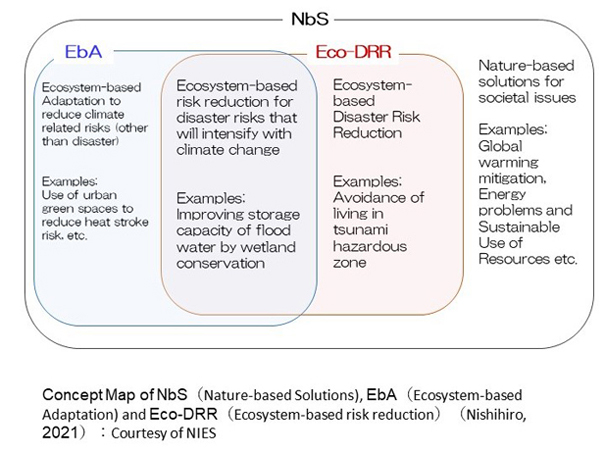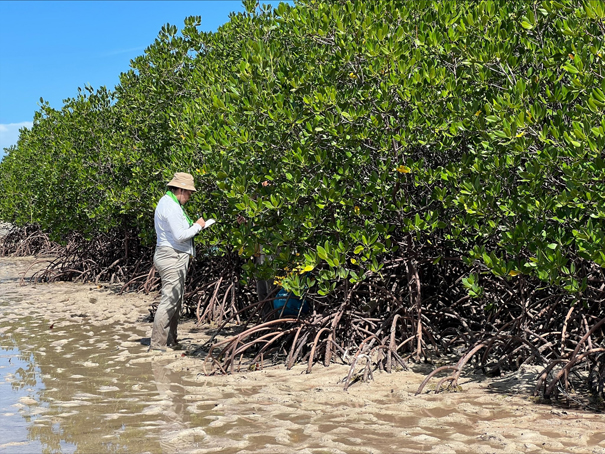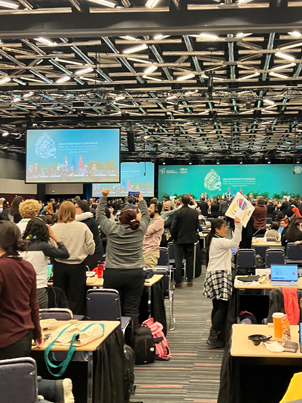
Activities
Nature-based Solutions
Nature-based Solutions : A Solution that Addresses Climate Change and Biodiversity Issues in an Integrated Manner
Nature-based Solutions (NbS) is a concept proposed by The International Union for Conservation of Nature (IUCN) in 2009.
It is defined as “Actions to protect, sustainably manage, and restore natural or modified ecosystems, that address societal challenges effectively and adaptively, simultaneously providing human well-being and biodiversity benefits” (IUCN, 2016).
In recent years, the role of NbS has received increased attention and recognition in international discussions related to biodiversity and climate change adaptation, agreeing that climate change and biodiversity should now be addressed as one.
OECC is engaged in research and project formation related to nature-based carbon credits such as afforestation, REDD+ and blue carbon (seaweed beds and mangrove plantations), as well as Ecosystem-based Disaster Risk Reduction (Eco-DRR), which is included in the NbS concept.

Study on Mangrove Plantation Project in the Visayas Islands, Philippines
In 2022, OECC conducted a study of a mangrove plantation project in the Visayas Islands in the Philippines as part of the Forestry Agency’s work to utilize the Joint Crediting Mechanism (JCM) for forest conservation and afforestation projects in developing countries.
This afforestation project has been conducted by Kanepackage, Co., Ltd. since 2009 as part of its Corporate Social Responsibility (CSR) in cooperation with local communities, local governments, and related ministries and agencies. To date, more than 13 million mangrove trees have been planted through this project.
OECC is calculating the volume of GHGs absorbed by mangrove plantations, conducting interviews with stakeholders and is considering the creation of carbon credits that will lead to the conservation of mangrove ecosystems and benefits to local communities.

OECC’s study on carbon crediting of mangrove plantation projects
*Details of this mangrove plantation project: (1) Video (2) Report by Kanepackage, Co.,Ltd.
Future Initiatives: Future Efforts on Supporting Agriculture Sector
In recent years, deforestation for agricultural land use and overuse of chemical fertilizers and synthetic pesticides have caused biodiversity loss, soil pollution and the release of GHGs into the atmosphere. To tackle these issues, it is expected that conventional farming methods will be reviewed and environmentally friendly agriculture that can contribute to climate change countermeasures and biodiversity conservation will be adopted.
OECC will support international efforts by the Japanese government and companies in the agricultural sector to enhance biodiversity conservation based on its extensive knowledge and experience in the climate change field.
International Negotiation Support Services
The Convention on Biological Diversity (CBD) came into force in 1993 to address global biodiversity issues. Under the Convention, multilateral cooperation through resource mobilization, capacity building and scientific and technological cooperation is being promoted to solve biodiversity issues.
OECC participated in the 15th Conference of the Parties to the Convention on Biological Diversity (CBD COP-15) held in December 2022 as a member of the Japanese government delegation and was responsible for supporting international negotiations.
We will continue to support other international negotiations, drawing on our experience of the CBD amongst other international agreements.

Scene at the adoption of a resolution at the CBD COP-15
